- Home
- Edward Lee
Sacrifice Page 2
Sacrifice Read online
Page 2
They should be done any day now, she thought. She parked the Audi on the street, behind the plumber’s van. The street’s incline, as well as the position of the watch room, would make a driveway out front inconceivable. One day perhaps she’d turn the old brick carriage house in the backyard into a garage, but there was no rush on that.
The interior had been completely re-wired, re-walled, and re-piped. The plumber, too, had demanded a small fortune, but now that Alice could afford the very best work she saw no reason to skimp. Her life, she knew, would never be perfect, but that was how she wanted the house. Perfect, she thought now. My perfect little house.
She got out of the Audi and gazed upward.
Yes, the Taylor Watch House was exactly that.
Perfect.
««—»»
“Bet you’re gettin’ sick of my mug,” said George, the husky bearded plumbing contractor.
Well… Alice thought. Actually he was very nice, in spite of the scary, blurred tattoos on his forearms. She just wished he’d finish! “Not at all,” she said. “I’m really happy with the work you’ve done.”
“Everything’s rerouted now, and tight as a drum,” George bragged. His long black hair had been blow-dried and styled; he looked like a kempt biker. “You have any problems at all, any leaks, any noises—anything—you call me day or night.” He gave her his card. “I’ll be here faster than ice melts in hell.”
“I appreciate that, George.” Alice smiled, but strained not to teeter. George was an attractive man, in a rough and earthy way. But did he think she was attractive? Does he know? she wondered. Can he tell? Her smile threatened to crumble. He probably feels sorry for me. Over the hill. Fat. Dumpy. No suntan, no—
“You were asking about the basement earlier,” George reminded. He walked down the hall. “We can do the job, but it’s gonna be a killer of a bill. The basement’s all mortared rock. To get a drainage line out we’d have to dig, and that’s big money, ’specially with the way the property slants down toward the bay. You ask me, save yourself fifteen or twenty grand and keep the washer and dryer in the room off the short hall across from the basement door. It’s all hooked up right now, just as pretty as you please…”
Pretty as you please. Alice’s mind wandered. Am I pretty, George? Will I ever be as pretty as you please?
He kept walking toward the kitchen. Of course, that’s where she’d put the checkbook. But Alice didn’t want to follow. She didn’t want him to…
“This really is a nifty joint now,” George appraised. “Whoever your interior decorators are, they know their squat. You got every modern convenience without messing up the original atmosphere; you know, the look of its history.”
This articulateness surprised her; George didn’t strike her as someone who appreciated such things. Actually, Alice had conceived of the house’s interior remodeling herself. The ideas had just come to her: schemes, layouts, just the right wallpaper, carpet, furniture. “I like it, too,” she eventually said. “A lot.”
Only when he’d turned his back again, to head for the kitchen, did Alice follow him. She refrained from wincing, something she’d learned now to the point of instinct. She quickly scribbled a check for the invoice amount, then gave George a hundred-dollar bill as a tip.
“Not necessary, Ms. Sterling,” he asserted, holding up his large, opened hand. “Really, I couldn’t—”
“I insist. Take your girlfriend out to dinner or something.”
“Girlfriend? How do you know I’m not married?”
You’re too handsome to be married, came the foolish thought. “Wife, girlfriend, whatever,” she said.
“Well, if you say so.” George, grinning, pocketed the bill. “It’s been a pleasure, Ms. Sterling.”
“Please, call me Alice.”
“Right. Alice. And remember, any problems at all—”
“And you’ll be here faster than ice melts in hell.”
“You got it. Take care. I hope you enjoy your new place.”
“Good-bye, George.”
When the burly contractor had gone and closed the great, ingrained door behind him, Alice sighed and leaned in relief against the kitchen entry. It was always a relief when she was alone.
And a sad thought tarried.
I’ll be alone for the rest of my life.
Who should she blame? The universe? God? The fates?
Should she blame Steve?
None of that mattered now. She knew if she had to blame anyone, it would be herself.
At least I’m alive. That’s good, isn’t it?
When she walked back down the hall to the watch room she did so with a slight but undeniable limp.
««—»»
Last winter seemed like a decade ago, shards of memory that didn’t even feel real anymore. Thinking back on it now was more like remembering an old TV mystery…
“Ms. Sterling?”
Images like light suffused through fog. A slow sensation of spinning. Nausea. Distant pain…
“Ms. Sterling? I’m Dr. Greene. Can you hear me?”
“Yes,” Alice managed to whisper. In a moment her vision cleared. A broad-shouldered doctor with short blond hair was looking down at her. She felt his finger read her pulse.
“You’re at South County General Hospital, Ms. Sterling, and you’ve been unconscious for about three days. You were in an accident.”
The word jarred her. Accident. That could mean anything. She noticed the rails now, on the elevated hospital bed. She noticed the high, inverted IV bag, whose line ran to a needle sunk into her right arm. She noticed stray wires, medicinal scents, and a LIFE-PAK heart monitor. Her face hurt.
“Accident,” was her only reply.
“But you’re all right,” Dr. Greene quickly added. “You suffered a minor orbital concussion; nothing serious. And a broken nose. You’re very fortunate to be alive.”
Alice blinked rapidly. It was hard to swallow. Accident, she thought again. More chips of memory began to refit. The snowy road. Dual orbs of wavering, hectic bright light. Like headlights. “Was it a car accident?” she whispered.
“Yes, Ms. Sterling, it was, and a very serious one, judging from the wreckage. Evidently you were fixing a flat tire. A drunk driver in the oncoming lane…”
He needn’t say more; at once she remembered. She’d been coming back from Steve’s, terribly upset. It had been snowing, and the back county roads were always the last to be plowed and salted. She remembered tears in her eyes as the snow reduced her progress to a snail’s pace. To make matters worse, her left rear tire had gone flat.
Greene went on, though he suddenly seemed reserved. “The way it appears, Ms. Sterling, is you were trying to change the tire when you noticed the car in the oncoming lane. You managed to jump back into your own vehicle just as it was impacted. If you had waited another second to react, there’s no doubt you would’ve been killed.”
For some reason this information barely interested her. She was thinking about…Steve. Why had she been so upset? What had happened? Steve, Steve, she thought. What happened with Steve?
“Now, Ms. Sterling.” Greene’s tone grew somber. He was looking down at her with very clear green eyes. “As I’ve said, the accident was severe, and it’s very fortunate that you suffered no life-threatening injuries. You’re going to be all right.”
It sounded as though he was leading up to something, skirting some as yet undisclosed point. “What’s—what are you trying to tell me?” she asked, not fooled by his elusiveness.
“Ms. Sterling. You didn’t quite get all the way back into the car when the other vehicle hit you.” Greene paused, looking down with a face blank as a stone carving. “Your left leg was severed seven inches below the knee.”
— | — | —
2
The firm had backed her up from the start; her boss, Karl North, had taken the case and had done a very efficient job of defaming the driver of the oncoming vehicle: one Michael K. Crause, who owned the bigge
st marina on the City Dock. Crause had fled the scene but was picked up shortly thereafter by the county police. He blew a .3 on the Breathalyzer, more than enough to qualify as legally drunk by state BAC standards, and he still faced criminal charges for the DWI and fleeing the scene of the accident. As for the civil charges, Crause’s insurance carrier had settled out of court for low seven figures, and Alice’s firm had only taken a 10 percent contingency instead of the typical 33⅓. And since the award was punitive and compensative, Alice hadn’t had to pay taxes on any of it.
She had bought the Audi, and the Taylor Watch House; most of the rest of the money she had invested via the renowned Luce & Associates brokerage firm downtown. Even with fluctuating interest rates, Alice would never have to work again if she didn’t want to. By most people’s standards, she was rich.
She was also an amputee.
Alice hadn’t taken the initial news well. “Sew it back on!” She had screamed. Certainly, in this day and age of medical miracles, such things could be done; she’d read of it many times. That guy in Virginia, for God’s sake. They’d sewn his penis back on! But Greene calmly informed her, “I’m afraid that’s not possible, Ms. Sterling. The police and the EMTs searched all night and all the next morning. The limb was officially determined to be lost.”
“Lost!” she railed at him from the bed. “You’re talking about my leg, for God’s sake! If it’s lost, find it!”
“On impact, Ms. Sterling, the limb was more than likely jettisoned deep into the woods and then covered by snowfall. Either that, or—”
“Or what?”
“It’s also quite possible that it was… carried away. By an animal.”
The image was awful: her lower left leg, covered by the shorn black stocking, buried under snow in the woods somewhere, or “carried off” by a dog or a possum. She’d have dreams of such—animals making a feast of her leg, her own flesh gnawed off the bone and swallowed. She even gruesomely wondered if the maroon LaCourte shoe had remained on her foot. One day a hunter or hiker would no doubt find the bones and the shoe and nothing more. It had taken weeks of psychotherapy to banish these grotesque images.
The good Dr. Greene had warned her what to initially expect. “You will have to walk with a crutch for a time, but I think you’ll find that, because the limb was severed well below the knee, after a short period of therapy you will be able to ambulate unaided.”
Ambulate; she considered the word. Unaided.
“With a slight but noticeable limp,” Greene added. “You should also expect a three- to six-week period of dissociated depression, quite like the syndrome known as post-natal depression.”
This sounded quite odd. “Post-natal?” she queried.
“The depression a woman often feels upon losing part of herself. You needn’t worry; with proper therapy and medication, it won’t persist. But there is one thing that will persist for quite a while, perhaps even for the rest of your life. We call it amputative allachaesthesia, or Ghost Limb Syndrome.”
Alice’s face screwed up in confusion.
“You will continue, at times, to register sensations in your lower left leg. You will feel pressure, you will feel the contact of your clothing, you’ll even scratch at itches, and you’ll absolutely swear you can feel your toes wriggling in your left shoe.”
This made no sense at all. “But that’s impossible, isn’t it?”
“The sensations, of course, are all imagined—a tactile hallucinosis. Your mind has been used to feeling your leg, over the course of your life up to now. No one’s quite sure why this phenomenon persists, but it does. And you’ll simply have to get used to it.”
Alice didn’t care for the doctor’s tone of voice. It seemed almost snitty, smartass. “That’s not what I would call good bedside manner, Dr. Greene. I just lost my leg, and you’re telling me to get used to it? How would you like it if a doctor said that to you?”
Greene’s blank face was more effective than a frown. “Don’t misunderstand me, Ms. Sterling. But on the same hand, don’t misunderstand yourself. True, you lost your leg in an unfortunate accident; yet in spite of that loss you’ll be able to lead a normal, satisfying life. You should be grateful you weren’t paralyzed or killed. If you think you’ve got it bad, come on down to my quadriplegic ward. I suspect you would find your attitude adjusted rather quickly.”
««—»»
Greene’s browbeating comments hadn’t helped much. It didn’t happen to you, Alice always thought when the guilts marauded her. She tried very hard to count her blessings, as Dr. Greene had advised, but it all fell apart whenever she glanced down and viewed the stump on the end of her left leg. Even before she signed out of the hospital, the sheer weight of her emotions overwhelmed the realization that things could’ve turned out a lot worse. And it made her feel very guilty…
But rationalization worked both ways, didn’t it? It was always easier for them to say. They weren’t the ones who’d lost a leg. They weren’t the ones who’d have to deal with it for the rest of their lives. Every day the fears worsened: the things Alice wanted the most were now the things she feared she’d never have. A husband who loved her. Children. A dog in the yard, and a white picket fence, and a two-car garage. PTA meetings and Boy’s Club and Girl Scouts and Christmas trees and dressing the kids up for Halloween. These were simple, conventional things, but Alice wanted them more than she’d ever wanted anything in her life.
And now I’ll never have them, she felt certain.
Her depression was immediately obvious. Greene had prescribed an antidepressant called Tofranil. “It’ll help you feel better,” he told her. When it didn’t, he prescribed Elavil, then Prozac, then Lithium. Nothing worked. “Your depression is non-catecholamic and strictly reactive,” he told her. “In other words it is not relative to any genetic or biogenic-related causations.” Alice didn’t know what the hell he was talking about. All she knew was that she didn’t have a lower left leg. “When you leave the hospital, after your fitting, you’re going to have to pursue psychotherapy.”
The mere word psychotherapy made her feel maladjusted, ruined. Eventually the fitting technician had brought in the box. GRIME, INC., the label read, PROTHESIS, ONE. LEG, LEFT TRANSECTION. TONE: F. SHADE 012c. She noticed no strap or brace as she’d previously imagined; no clamps, no snaps. Padding in the cap of the “transection cover” could be added or subtracted in order to affect “an exact heel-to-knee counter-margin,” she was told by the fitting technician, a pleasant, elderly woman who had an artificial leg herself. “There. A perfect fit.” The edge of the cap simply rolled upward, quite snugly. “And you’re lucky,” the elderly woman went on. “You’ve got plenty of stump left. Otherwise we’d have to use a more severe attachment series.”
Attachment series. Plenty of stump left. These terms only invigorated Alice’s self-disgust. They sounded cold, ugly. However, the prosthesis looked surprisingly real— so lifelike it unnerved her. It deceived her. It looked like…a real leg. Complete with separated toes whose nails she could even polish. “Suntanning yourself will be an obvious problem,” informed the technician. “And if you want to jog, ski, or whatever, you’ll have to buy a special athletic braced model.” Alice felt confounded. Skiing? Jogging? And as for suntans: “Certainly you don’t think I plan to wear a swimsuit,” she said. “Why not?” countered the old woman. “The prosthesis is part of you now. Don’t ever be ashamed of it.”
Ashamed wasn’t the word—haunted was more like it. The leg haunted her. In spite of its realistic appearance, it further enforced her already dwindling self-esteem. It’s fake, she remembered thinking on her first day back home. She was hot and close to tears. It doesn’t matter how real it looks, it’s still fake. It’s still…an artificial leg.
Such was Alice’s true haunting. It didn’t matter that she hadn’t been injured more severely. It didn’t matter that she’d lived. No effort of rationalization or positive thinking would ever erase the trepidation.
The last thing
she’d asked the fitting technician was this: “Are you married?” “Well, no,” the elderly woman had answered. Hence, Alice’s fear: No man will ever want me.
««—»»
Nights proved the worst for her. She’d sleep fitfully, soaked in sweat. She’d dream of herself fat and pale.
Old. Alone. A recluse.
Often she’d dream of Steve, and revisit all she’d seen that evening. And on such nights she discovered that Dr. Greene’s warning held all too true.
From her nightmares she’d waken, furiously scratching at an itch on a leg that was no longer there.
— | — | —
3
“I heard you’re dating Colleen Grant,” Shauna said, daintily sipping her Windex shooter. This infuriated Steve. You don’t sip shooters, ya ditz, he wanted to say. You throw them back. Steve threw his back. Word gets around, he thought. Can’t women keep their yaps shut? “Yeah, we’re seeing each other,” he eventually said, but then added, “Nothing serious.”
Shauna Appelgate turned on her bar stool, her lips cynically turning up. She was a slim, attractive woman, in her later twenties, with overdone bleached-blond hair. She wasn’t particularly gullible, though. “That’s not what I heard,” she insisted, and flagged the barkeep for an Amstel Light. “I heard you two were nearly engaged.”
Christ. Pretty soon I’m not even going to be able to get laid in this town. Sure, he’d been dating Colleen steady for several months, and when she’d started to get antsy about a commitment, sure, he’d implied marriage. That was the only way to keep them on the line; Steve wasn’t ready to dump her yet. As good as she is in bed? Are you kidding? Steve planned to string her along till the end of the summer—by then he’d be sick of her. Besides, lately he’d been getting more strange than he knew what to do with…

 In the Year of Our Lord 2202
In the Year of Our Lord 2202 The Minotauress
The Minotauress Terra Insanus
Terra Insanus The Stickmen
The Stickmen Flesh Gothic by Edward Lee
Flesh Gothic by Edward Lee Family Tradition
Family Tradition You Are My Everything
You Are My Everything The Backwoods
The Backwoods The Teratologist
The Teratologist Smoke and Pickles
Smoke and Pickles Buttermilk Graffiti
Buttermilk Graffiti Dahmer's Not Dead
Dahmer's Not Dead Quest for Sex, Truth & Reality
Quest for Sex, Truth & Reality The Innswich Horror
The Innswich Horror Brides Of The Impaler
Brides Of The Impaler Goon
Goon Trolley No. 1852
Trolley No. 1852 Sacrifice
Sacrifice Monster Lake
Monster Lake Succubi
Succubi Lucifer's Lottery
Lucifer's Lottery Monstrosity
Monstrosity The House
The House The Dunwich Romance
The Dunwich Romance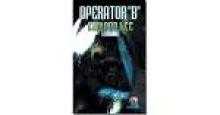 Operator B
Operator B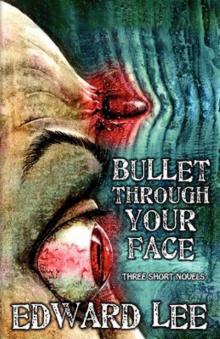 Bullet Through Your Face (improved format)
Bullet Through Your Face (improved format) Grimoire Diabolique
Grimoire Diabolique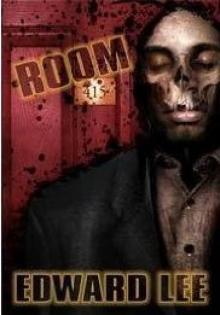 Room 415
Room 415 The Messenger (2011 reformat)
The Messenger (2011 reformat) Incubi
Incubi The Black Train
The Black Train House Infernal by Edward Lee
House Infernal by Edward Lee City Infernal
City Infernal Creekers
Creekers The Haunter Of The Threshold
The Haunter Of The Threshold Mangled Meat
Mangled Meat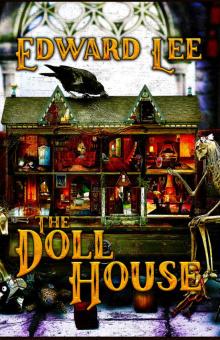 The Doll House
The Doll House Header 2
Header 2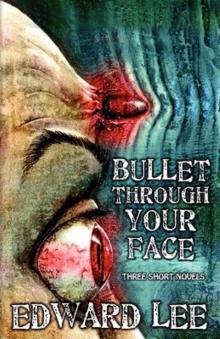 Bullet Through Your Face (reformatted)
Bullet Through Your Face (reformatted)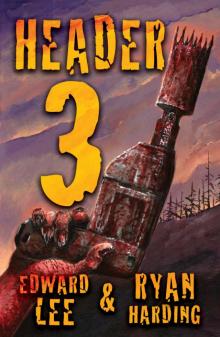 Header 3
Header 3 Infernal Angel
Infernal Angel Pages Torn From a Travel Journal
Pages Torn From a Travel Journal Edward Lee: Selected Stories
Edward Lee: Selected Stories The Bighead
The Bighead The Chosen
The Chosen